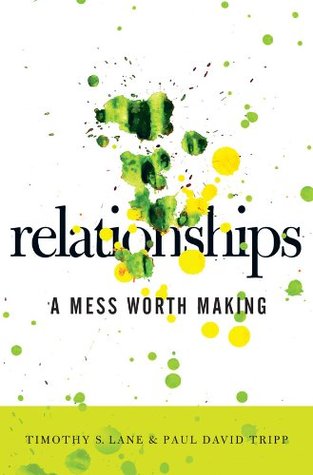More on this book
Community
Kindle Notes & Highlights
What you are about to read is a book on relationship that was written in relationship.
What resulted from our collaboration is not just an examination, but an actual example of broken people in broken community experiencing the reconciling grace of God.
However, problems arose when we, as two leaders who had known each other only from a safe distance, began working together in the same room!
Our aim is that this book will help you look through the shattered glass of our sin to see the glory of a Redeemer who is ever-present, always at work to rescue and change us.
“You see, this is what you always do. I come to you and you turn the table on me. You are so good at making other people feel guilty for your failures!
What were the unspoken rules your family followed? How did you handle conflict? What was the typical method for solving problems? Were there regular patterns of forgiveness?
but God wants to bring us to the end of ourselves so that we would see our need for a relationship with him as well as with others.
Genesis 2 is not speaking primarily to Adam’s experience of being lonely as much as it is revealing his nature as the person God created him to be. Because God created a communal being—someone designed for relationships—creation is incomplete without a suitable companion.
The reason we know this is true is because the word “helper” is often used to describe God’s relationship with his people.
Each of us is tempted to make relationships the end rather than the means
We settle for the satisfaction of human relationships when they were meant to point us to the perfect relational satisfaction found only with God.
The health and maturity of a relationship are not measured by an absence of problems, but by the way the inevitable problems are handled.
The fact that our relationships work as well as they do is a sure sign of grace
Jesus was willing to be the forsaken brother so that we could have godly relationships. Jesus was willing to be the crucified King so that our communities would experience peace.
The hope of the gospel invites us to a holy dissatisfaction with all of our relationships, even—especially—those with few major problems.
I loved my family, but that night in the car I hit the wall of the reality of relationships in a fallen world.
They have all faced the difficulty of having relationships with flawed people in a broken world, and they have opted to check out.
We live with this tension between self-protective isolation and the dream for meaningful relationships.
The frustrated relationship
The isolationist feels smothered; the immersionist feels rejected.
The enmeshed relationship
they both become highly sensitive, easily hurt, and critical.
The isolated relationship
In each scenario there is a relational impasse. In the frustrated relationship, the movement is away from the other. In the enmeshed relationship, the move toward the other is so extreme that it is impossible to satisfy expectations. In the isolated relationship, the movement towards safety precludes real relationship.
On the other hand, immersionists are convinced that relationships are everything. (“Without relationships, I am nobody.”) These conclusions
Communion with this God is at once also communion with those others who have entrusted themselves in faith to the same God.
But, rightly understood, theology is the real life story of God’s relationship to us and our relationship to one another lived out in a broken world.
Our relationships must be shaped not by what we want, but by what God intends.
Sin’s self-centeredness cuts us off from God and others
Jesus’ language on this point is striking. He welcomes us into this divine community with Father, Son, and Spirit so that we can experience community with one another.
That evening in the grocery store parking lot, my problem was not just that I didn’t love my family as I should. My problem was...
This highlight has been truncated due to consecutive passage length restrictions.
God will dwell in community with his people so that they can know community with one another
The perfect, eternal love relationship between Father, Son, and Spirit was ripped apart to allow us to be restored to God and reconciled to one another.
When you look at the various stages of a person’s life, what do you observe? We are dependent on our mothers from the moment of conception. As soon as we’re born, we need our family’s care to survive. Even as we grow more self-sufficient, we still seek out human companionship. As teenagers we desire the acceptance of our peers and begin to experience the pull towards deeper, longer lasting, and more committed relationships. As adults we live in a variety of intersecting communities: family, church, neighborhood, and work. As we get older, we look back on our lives and remember the web of
...more
What does all this biblical and experiential data tell us? That you cannot talk about human beings made in God’s image without talking about relationships. Yet it is often the first thing we overlook. Only when human beings live in community do we fully reflect the likeness
Because of the coexistence of sin and grace, we all shift between denying and affirming our humanity.


